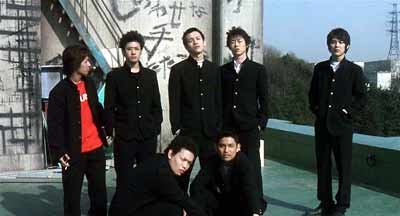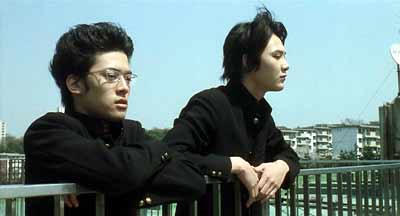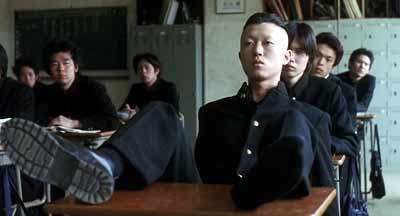Blue Spring
We never had uniforms this cool at my school...

Asa High School, Japan. An unassuming, slightly run-down building surrounded by a single playing field and rows of Cherry blossom. Columns of smartly dressed young men file into the schoolyard every morning, and to the untrained eye it probably seems like the most average, normal school imaginable. The untrained eye would be wrong. The corridors of Asa High are a battleground for gang supremacy; witness to acts of shocking brutality and a struggle for power that'll make your 1st Grade ducking in the boy's toilets look like a picnic by comparison.
Would-be School Rulers earn the title of King by competing in a bizarre, high-stakes game of dare; leaning from the railing several stories above the ground, he who can clap his hands the most times without plummeting to his death reigns supreme. The latest to assume ultimate authority is Kujo (Ryuhei Matsuda), a quiet, slightly introverted young man who has no great designs on leadership, but rather seems content simply to prove that he's top dog. Surrounded by his classmates Kimura (Yusuke Oshiba), Yukio (Sousuke Takaoka) and childhood friend Aoki (Hirofumi Arai), Kujo struggles to keep the gang together as the rigours of gang life and the nagging suspicion their lives have already been wasted threatens to ruin their delicate friendships.
The rigours of high school life might not be uncharted territory; in fact it's rather a popular topic for the Japanese film and television industries. Blue Spring, based on a comic by Taiyo Matsumotot, manages to appear suitably fresh, however, with it's stylish direction and superb performances from it's young cast. Writer/Director Toshiaki Toyoda has done a fine job in avoiding the many clich?s inherent in the genre and crafted a decidedly unique and individual experience that carefully balances violence with humour without ever appearing exploitative.

The best way to describe the mood would be if Battle Royale had never gotten to the island and the violent classroom conduct had carried on unchecked. Unruly kids eat lunch in the middle of lessons, throwing shoes at teachers and offering each other the occasional clock around the back of the head with a baseball bat every now and again. It's the kind of self-perpetuating nonsense you'll remember from your own school days, only here it's taken up a notch or two; piss these guys off and you might just get your manhood trapped between a big stick and the washroom floor. As things spiral increasingly out of control, Toyoda coaxes some fine, restrained turns from his young cast in roles where Tony Montana levels of character opulence might have been an easy trap to fall into.
Matsuda is excellent as Kujo; quiet and reserved despite the authority he holds over his 'subjects'. Almost as if to bring some relative calm and serenity to the school, Kujo's reign is typified by a placid sense of rulership that suggests he may well have risked his life in attaining his status in order to give everyone a break from the tyrannical rule of his predecessors. As benign as he may at first appear, however, Kujo's calculating sense of justice soon becomes apparent to several would-be challengers. The sense of desperation in the school manifests in several of Kujo's friends too, most notably the quiet, thoughtful, but apparently unhinged Yukio who finally snaps when the impetuous young Ohta's (Yuta Yamazaki) bad-mouthing of Kujo leads him to introduce his belly to a foot-long kitchen knife. Several times.
Slightly less apocalyptic in nature but no less socially inept is Kimura, another of the friends who dreams of being a baseball star, but whose involvement in the gang culture leaves him with the belief he has no option other than to join the Yakuza. Perhaps the most tragic story however is that of Aoki, Kujo's oldest friend. Increasingly envious of Kujo's status and eventually unbalanced by claims that he has become little else than the King's 'gofer', Aoki takes leave of his senses, and school, before returning with a new haircut and a more than slightly violent temperament. So the scene is set for a battle of wills between the two oldest friends, and a climactic showdown you just know is going to end in tears...

Toyoda's direction is excellent, helping his young stars build a considerable degree of sympathy and character depth, even with those most introverted and least vocal. Building events around the theme of 'flowering', the director juxtaposes the growth and metaphorical death of his main protagonists with the flowers they plant early on in the school yard with the help of the school's midget gardener (the only off-beat entry in a film which is otherwise uncharacteristically accessible to Western audiences). As the sense of despair envelopes the boys one by one, so their desire to tend the garden wanes and their flowers die, until only Kujo's comes to blossom. It's a subtle (if slightly obvious) metaphor, but it provides moments of calm introspection that give the film it's humanistic core.
Another welcome decision made by Toyoda is to restrict the majority of the violence to being merely implied. Of course, as is often the case, this can sometimes lead to a more shocking sense of brutality (Yukio's murder of Ohta or Aoki's 'can sandwich' attack on another pupil being prime examples), but it moves the focus of the movie away from exploitative violence among teenagers and avoids more dubious moral debate that would otherwise detract from the real point of the movie and the excellent performances of the cast. Light relief is also afforded the viewer thanks to a superb rock soundtrack supplied mostly by Thee Michelle Gun Elephant which provides a superb aural framework for the disenchanted goings on at Asa.
Many people are going to draw thematic parallels between this and other high profile Asian student movies (such as Battle Royale) but in reality it's a world apart. Blue Spring relies less on dark humour and is rooted far more comfortably in contemporary reality. It is stylish without being pretentious, honest without being excessively brutal, and most importantly entertaining without being exploitative. As the focus of popular Asian cinema moves away from the Woo-inspired action juggernaut and begins to branch out into more cerebral realms, Blue Spring provides ample evidence that the Far East has more to offer film fans than dual handguns and inaccessible leftfield humour. Excellent stuff.
Disko has awarded this movie 4 out of 5 Disko Love Units
Hirofumi Arai (Aoki)
Sousuke Takaoka (Yukio)
Yusuke Oshiba (Kimura)